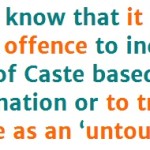As a tribal woman, Nitu Chakhia has spent far too many years of her life struggling for survival in the urban jungle of Bhubaneshwar. Several years of working with her people has convinced her that communities coming together ensures change. Odisha is a state that takes serious interest in its roads. Dedicated websites announcing work in progress or funding status abound on the internet, and multiple schemes have been dedicated to improving the state. However, official announcements often fail to materialize into real roads. Nitu had seen this reality while nursing her political aspirations, and had vowed to change life for the people of Shikharchandi. When she joined the IndiaUnheard network, she knew where her work would begin. Despite the community being slightly skeptical, Nitu was absolutely confident that she would succeed in getting them a new road. She explained the process of IndiaUnheard, and soon, Mamata Reddy agreed to give her an interview. After extensively filming the state of the road, Nitu and a group of women from the village approached the Bhubaneshwar Municipal Corporation (BMC) with an application to ensure the road was constructed at the soonest. " We went to the BMC and straight away asked to meet the engineer in charge. When we told him about the road & it's condition, how people suffer every monsoon, he was politely responsive. However, when we started questioning his purpose of installing a foundation stone for a project that had not even begun, he began to get nervous, and realized that we were serious. Very serious. I think he got really scared when we told him calmly that this foundation stone very clearly stated that a certain amount of money had been allotted for the people's benefit. He was basically cheating people by not ensuring that the road was constructed in time. We didn't yell at him, or misbehave. We just very clearly stated the action that could be initiated against him. It was no surprise that he immediately asked his field engineers to investigate our claims." The BMC's investigation revealed that the community in Shikharchandi had valid reasons to be unhappy. The engineer immediately invited tenders for the contract to construct the road, and 3 months later in August 2013 a brand new road was made available for more than 2500 families in Shikharchandi village. When asked about the challenges of creating change, Nitu's giggles deftly disguise her fiery conviction. "They weren't letting me film. The engineer refused, citing official reasons. While he was more than happy to help, especially given how the community supported me, he simply refused. In fact, there were people outside the BMC office, checking all of us entering for cameras and stuff. I knew they allow the big TV channels to take their cameras. All the E TVs and MBC TVs can take their crews and cameras in. I wasn't going to leave without a single shot of our meeting. It lends so much credibility to the story. I've lost too much crucial footage in the past. Now I've learnt to transfer as soon as I'm done with a day's shoot." Nitu began her association with Video Volunteers as a rank amateur with technology. She recounts her fear of holding the camera, and how Manish Bhai & Ayush (VV Trainers) boosted her confidence immensely by praising her Piece-to-Camera bytes. "Being with IndiaUnheard has really given me the chance to do what I believe in. I'd always had a wish to participate in politics, because I seriously believed that that was a way for me to change the world I grew up in. However, despite that endeavor failing to take off, I continued working with the people & communities I had interacted with at that time. So when the chance to work with Video Volunteers came along, I had my networks, my causes, my communities all there, just waiting, aching for me to come change their world as they knew it." Interview: Radhika
Fighting for Change: The Story of Bihar-Based Journalist Amir Abbas
Inspiration can come from many sources, but one of the most powerful is seeing someone walk the path before you. Our Community Correspondent, Syed Amir Abbas found his inspiration in Stalin K., the founding director of Video Volunteers. “I met Stalin at VV’s national meet in 2017 and I...
The torch bearer of rights for marginalized tribals of Odisha
If you ask Video Volunteers’ Community Correspondent Bideshini Patel to rate her childhood on a scale of 1-10, she would probably give it a negative marking due to the neglect and abuse she faced. But if you ask her to evaluate her professional life as an impactful journalist, resolving basic...

